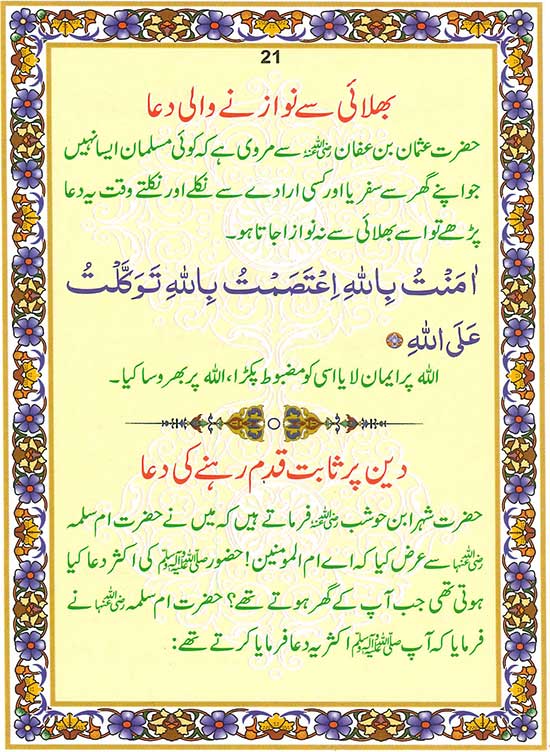
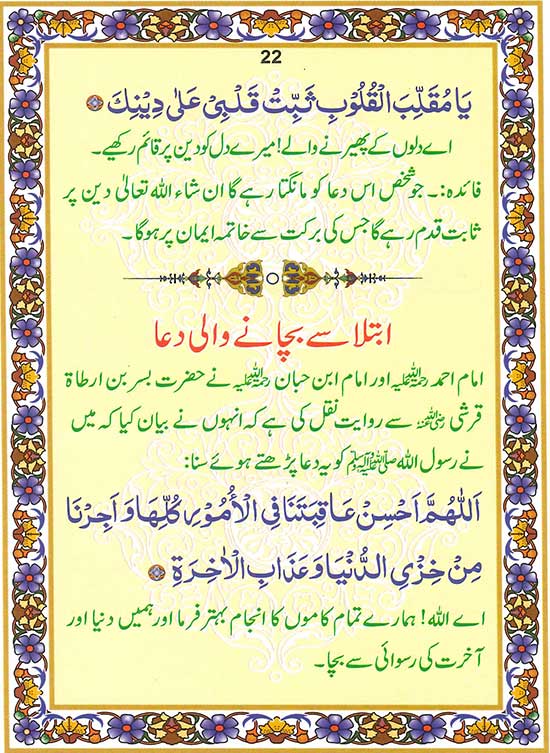
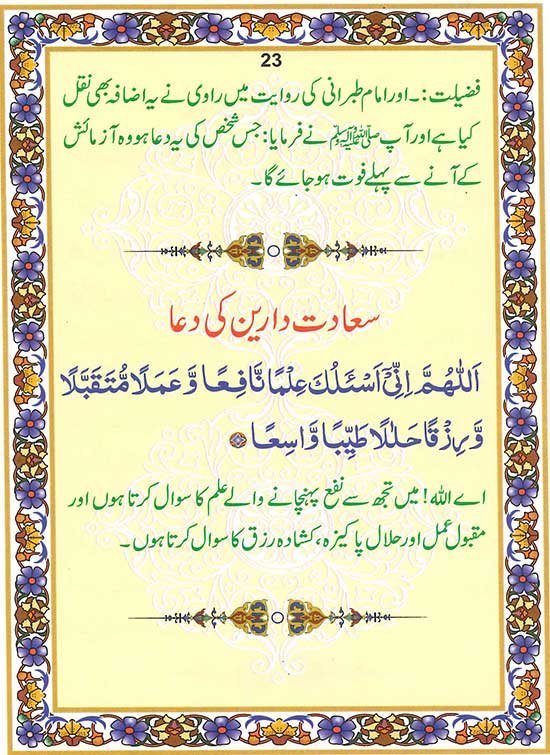
It Is Disliked To Eat A Lot Of Food Or To Eat So Little That Ones Body Weakens
Eating too much leads to many diseases, causes laziness, making one feel it heavy and burdensome to do deeds of obedience to Allah (swt) and hardens a persons heart – and we seek refuge in Allah (swt) from all of that. The opposite way, eating too little, also weakens a persons body, making him too weak to do acts of obedience to Allah (swt) . The best cure and prevention is what is prescribed by the Prophet (saas) and were we to follow the Prophets way, we would not, in many instances, have to pay a visit to the doctor. Miqdaam Ibn Madee Karib (ra) reported that he heard the Messenger of Allah (saas) say,
A human being has never filled a container that is worse than his stomach. It is sufficient for the son of Adam to have just that amount of morsels that cause his back to remain upright. But if there is no excape (i.e., he wants more), then one third for his food, one third for his drink, and one third for his breathing. 1
We would do well to heed what some of our pious predecessors had to say about this subject. Ibn Abdul-Barr and others related that, one day, when Umar Ibn Al-Khattab (ra) delivered a sermon, he (ra) said, Beware of gluttony, for it makes one lazy from prayer and it is harmful to the body. Upon you is moderation in your food, for that will keep you further away from ungratefulness, healthier in your body, and stronger to do worship. And a person does not become destroyed until he prefers his desire over his religion. Alee (ra) said, The stomach is the tank of the body: liquids come into it and flow out of it. If it is healthy, liquids will flow out of it in a healthy manner, but if it is sick, liquids will flow out of it with sickness. Fudail Ibn Iyaadh said, Two actions harden the heart: much talk and much eating. And it was said to Imam Ahmad, These are the people who eat very little food. He said, That does not impress me. I heard Abdur-Rahmaan Ibn Mahdee say, A group of people did the same and it resulted in them being cut off from obligatory duties (i.e., their bodies became so weak that they became negligent in performing obligatory duties).
1) Related by At-Tirmidhee (2380), who said, Hasan Saheeh; by Ibn Maajah (3349), and Al-Albaane gave a Saheeh grade to his narration; and by Ahamad (16735)
Halal Ki Targheeb Aur Haram Ki Muzammat
حلال کی ترغیب اور حرام کی مذمت
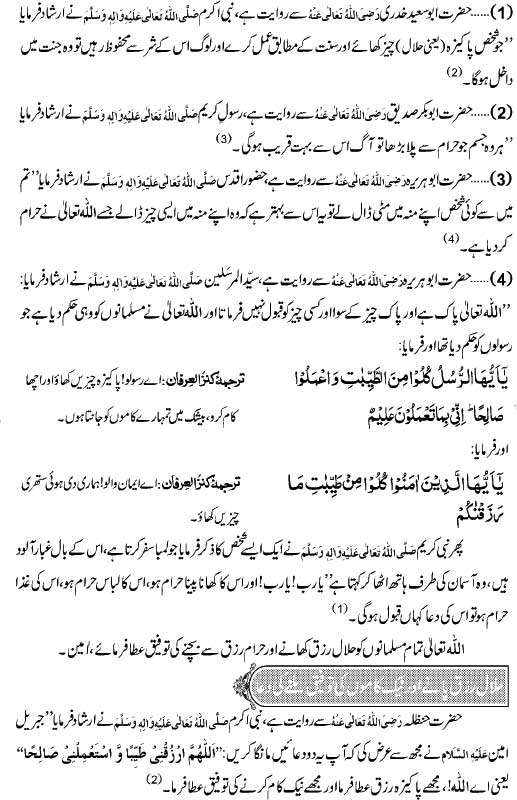
Ibn ‘Umar’s Vision of Hell
al-Bukhaari and Muslim report that Ibn ‘Umar said, “I saw in a dream that two angels came to me. Each of them was holding a whip of iron in his hand. Then I met (another) angel who was also holding a whip of iron in his hand. They said, “Do not worry, you are a good man; we just wish that you prayed more at night”. They took me to the edge of Hell, which looked like a well with horns: between every two horns stood an angel holding a whip of iron. I saw men hanging upside-down, held with chains, and I recognised some men of Quraysh. Then they led me away, towards the right. I told Hafsah about my dream, and she told the Messenger of Allah (saw) who said, “Abdullaah is a righteous man”. (at-Takhweef min an-Naar, p.51)
Inteqam
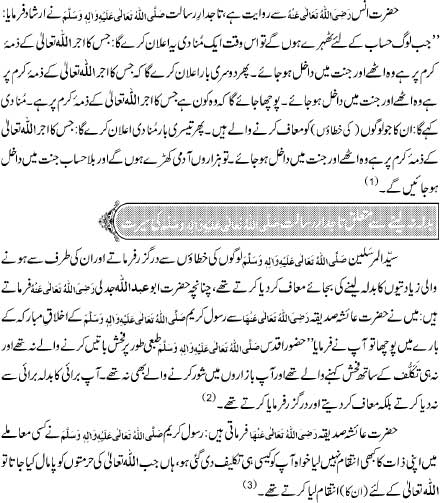
Prophet Muhammad : The Voluntary Way To Draw Close To God
Prophet Muhammad (peace be upon him) was always full of gratitude to God, expressing it right from the moment he woke up before dawn, using fine, clear and most expressive words: “My Lord! Whatever blessing I or anyone of Your creatures is enjoying this morning comes from You alone, as You have no partners. All praise and all thanks are due to You. My Lord! I have started this day enjoying Your blessings, sound health and protection. Perfect the blessings, health and protection You bestow on me in this life and in the life to come.”
Prophet Muhammad recommends us to glorify God and praise Him as we wake up: “Whoever says as he wakes up, ‘Praise be to God who has created sleep and alertness; praise be to God who has returned me safe and sound; I bear witness that God brings the dead back to life and that He is able to do everything,’ will be answered by God who says, ‘My servant tells the truth.’” It is great indeed that a human being should praise the Creator of the universe and God listens to the praise, accepting it and admitting that person to His service.
The Prophet says: “When any of you wakes up in the morning he should say: ‘We have come into this morning when all dominion belongs to God, the Lord of all worlds. My Lord! I appeal to You to grant me the goodness of this day: its gifts, help, light, blessing and guidance; and I seek Your shelter from any evil in it or in the days to come’. When the evening approaches he should say the same.”
People live in a dark cave whose walls are made of their own real or imaginary problems. It is sad to find intelligent minds unable to see further than the walls of such a cave and beating hearts feeling nothing other than the darkness of such a narrow cave. Muhammad, God’s messenger who knows his Lord well denounces such humiliating isolation. He says: “Every morning a caller addresses mankind, saying: “O You creatures! Glorify the Holy Sovereign”.
What I would like to say here is that it appears that only Muhammad’s heart has listened to this caller who urges mankind to tear away the curtains that keep them in ignorance and turn back toward God, the Holy Sovereign of the universe. His creative reminders are the result of his absorbing glorification of God and keen awareness of His greatness.
The great majority of scholars do not consider it a duty of a Muslim to repeat the glorifications and supplications we have quoted or will be quoting. They are only recommended. This is certainly true. However, I feel that it is necessary to reflect at length on such glorifications and passionate supplications when one’s heart is slackening and the relation with God weakens. They are highly effective in giving us the right concept of God and making us aware of the significance of His great attributes.
When faith is not based on enlightened vision it is ineffective. When conviction is only marginal, it cannot control behavior or keep wanton desire in check. Indeed, the Prophet’s companions were able to attain the summit of faith and change the course of history, replacing constitutions and morality with what were infinitely better ones, only because they were close to the Prophet, watching his life and guided by his light. They thus allowed his exemplary sincerity and love of God to fill their hearts as they filled his. Such is human nature. To my mind, listening to the Prophet as he addressed his supplication, and feeling his emotion as he appealed to God are bound to enlighten hearts and minds, motivating them to draw closer to God.
This type of glorification and supplication is only recommended, not a duty. But there is a measure of close contact with God that is a binding duty. This is related to the mosque and obligatory prayers. It is a duty incumbent on every Muslim to stand before God five times in every 24 hours to perform our obligatory prayers. Offering them in congregation in the mosque may be either a duty or an urged recommendation. The place of the mosque in Muslim society is high indeed. People who are careless about their prayers may find talking about it strange, because they prefer to pursue their desires.
With the first light of dawn Muslims aim toward the mosque. To strengthen their resolve the Prophet says: “Give those who walk to the mosque in the darkness of the night the happy news that they will have perfect light on the Day of Judgment.” And we read in the Qur’an: “On the day when you see all believers, men and women, with their light spreading rapidly before them and to their right.” (57: 12) “They will say: Our Lord! Perfect our light for us and forgive us. You certainly have power over all things.” (66: 8)
– By SHEIKH MUHAMMAD AL-GHAZALI
- March, 21
- 1761
- Prophet Character
- More
Zina Ki Mazammat
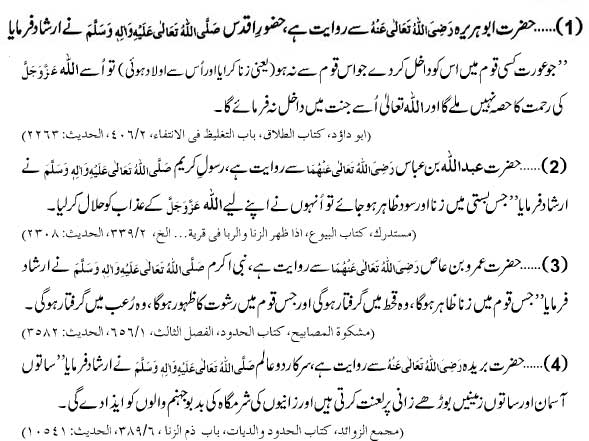
Beware Of The Supplication Of The Oppressed
[ALLAH’S Quran – 27:62] “Who responds to the oppressed when he calls out to Him, and relieves his suffering and who will make you inheritors of the earth? Then, is there a god besides God? How little you pay heed!”
The Prophet (Peace Be Upon Him) has said:
[Bukhari, Book #43, Hadith #628] “Narrated Ibn ‘Abbas: The Prophet sent Mu’adh to Yemen and said, “Be afraid, from the curse of the oppressed as there is no screen between his invocation and Allah.”
[Muslim, Book #001, Hadith #0027] “It is reported on the authority of Ibn ‘Abbas that Mu’adh said: The Messenger of Allah sent me (as a governor of Yemen) and (at the time of departure) instructed me thus:……………………………..Beware of the supplication of the oppressed for there is no barrier between him and Allah.”
- March, 19
- 3823
- Human Rights
- More
Dua Ki Qabooliyat
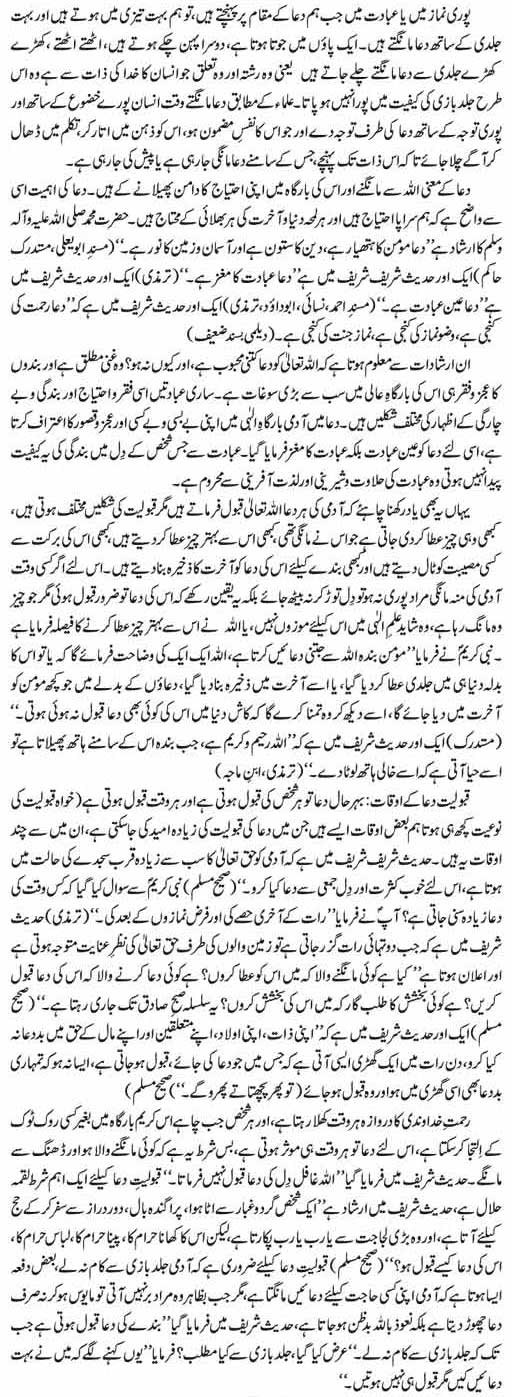
Tolerance And Solidarity Through Process Of Education
There has since been persistent effort to break the barriers of strangeness among peoples and bring about fraternal bonds among religions, races, cultures, ethnicities and civilizations. Based on the premises of unity of God and faith, Islam has invited peoples of all hues and creeds to congregate together to usher in a better tomorrow for everyone. In this spirit of peace and justice, fraternity and affinity, and spirituality and amicability, Islam once again stands ready to remedy the maladies in which the contemporary world is badly entrenched.
The balanced growth of the total human personality can be achieved through the process of education. For Muslims, according to the Holy Qur’an, Prophet Muhammad (peace be upon him) is the ideal model, (Uswatul hasana). One way of teaching this concept has been to try to live in that sublime image. Believers get accustomed to this norm by emulating the best virtues. The Holy Qur’an and the revered Sunnah thus provide Muslims with a compendium and source of moral truth, which has a definitive and interpretable dimension. Education, teaching and preaching thus furnish one with applicable principles useful in individual and collective life.
In defining a believer, the Noble Prophet (peace be upon him) said that in general he trusts in God, and in particular he adheres to a religion. Elaborating further, he explained that the believer is one with whom people’s lives, belongings, properties and monies are safe. With his gracious conduct, he would provide due protection and care to those who come into his contact and would not cause any harm to them.
Human values came from the first man and do not belong to Islam alone. Even a little child has an innate sense of right and wrong, an innate love for truth and mistrust for falsity, and repulsion to cruelty and hatred. This consciousness of justice and love for veracity cannot be a product of the physical self. Justice, truth, righteousness, honesty, love, beauty, mercy and compassion are in essence transcendent values. In every religion, civilization, culture and society, there are appreciable attributes. Islam completes them and therefore, by due recognition of others, it contributes and improves over them.
The Islamic approach to world peace is through the belief and establishment of the unity of all human beings. Another is through acknowledging all the Prophets of Allah and heeding their teachings, which boil down to the same message, i.e., the unity of the Almighty and faith in His injunctions. There are the two fundamental dimensions of Islam, i.e. moral excellence and global peace. In theory as well as in practice, Islam is the religion of tolerance, justice and coexistence. It does not compel people into its folds, as there is no compulsion in religion. Muslims treat others at equal footing and do not discriminate against them because of their color, creed, origin, status, race or language. But they also expect others to reciprocate likewise, as a matter of spiritual congeniality.
One should carefully note the ethics of peace, justice, cooperation, and tolerance in Islam. These aspects of harmony, in their various manifestations are alone what Islam desires on the face of the Earth. It harbors no ill will towards anybody and has no ulterior motives against anyone.
It does not approve of aggression, offense, violence and arrogance; but at the same time it wants to secure itself. “Anyone taking your land, persecuting you, killing your fellow Muslims, killing human beings generally, in that case, you have to act, defend the oppressed, the weak and the innocent.”
Similarly, when anyone is interfering in their way of life and their sovereignty, forcing injustices on them, Muslims have to fight for their cause. In Islam, the ethics of war prohibit the killing of civilians, women, children, priests and animals. It also interdicts torture, mutilation, cruelty, maltreatment or other inhuman perpetrations. Cutting trees, ruining property, destroying crops and food, poisoning water, or other scorched-earth measures are shunned. In fact, many current humanitarian provisions ought to be improved in the light of Islamic proprieties.
Like any other religion, Islam can be and should be judged only by its principles and the conduct of those who are the embodiments of them. Those who have gone astray represent neither the religion of Islam nor the community of the faithful. Peace and solidarity should be the goal of every religion, so that justice and harmony may be brought back among nations and the planet may bloom with the flowers of amicability and fraternity.
Let people forget their petty differences, revert to the essence of religion and rediscover the interrelationship between the spiritual, moral, intellectual, emotional and physical aspects of human existence.
All the religious communities have to work jointly and unitedly for the promotion of human solidarity and world tranquility. It is possible for persons belongings to different religions and cultures to come together on common grounds to formulate an amicable paradigm to coexist as a global community, adhering to the norm of “unity with diversity.” Instead of working against one another, they should pool their resources for the advancement of mutual causes towards a better future.
Institutionally, for the suppression of disruptive forces and enhancement of enshrined goals, a world council on ethico-moral values may be established with appropriate organizational and operative criteria. In the sublime interest of humanity, such efforts ought to be continued with genuine sincerity and vigor.

